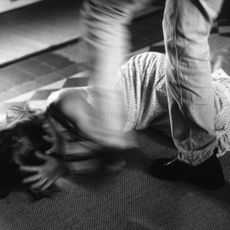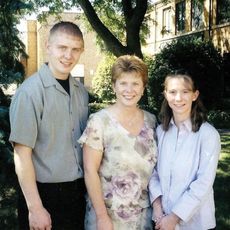
It was a bright summer morning in June 2007, and my husband and I had just dropped off our three young kids at school down the road from our home in the picturesque town of San Miguel de Allende in Mexico, where we'd lived for the past 15 years. As an American, I'd always dreamed of living in a place like San Miguel, with its charming town square where people gather at sunset to hear a chorus of birds. I was watching the countryside roll by on our drive home that day, when suddenly an SUV in front of us screeched to a halt, causing us to slam into it. As my head whipped back against the headrest, another car crashed into us from behind. Two men jumped out of the SUV with clubs, hammers, and guns. Before we could react, they were smashing our car windows and dragging us out of our seats.
It all seemed to happen in a fraction of a second—I heard breaking glass and the screams of my husband, Eduardo, as someone cracked a pistol on his skull. These men want to kill us, I thought, and I tried to break free. As my captor and I struggled, we fell to the ground; I pushed and he pulled. At some point, I grabbed a barbed-wire fence that ran alongside the dirt road; the wire went straight through to my finger bone, but I was too pumped with adrenaline to feel the pain. Then the man pointed his gun between my eyes and said, "Get up." I looked past the barrel, at the eyes hidden by dark sunglasses, and said, "Please don't kill me. I have children."
Minutes later, I was seated in a car next to Eduardo, our heads covered with heavy cotton pillowcases that smelled of detergent. I put my hand on his left shoulder and felt the wet warmth of blood. I feared that he would bleed to death or go into shock, so I tried to calm him, and myself. "God is all powerful," I said in Spanish. I'm not particularly religious, but with our lives hanging in the balance, I wanted to remind him that we were more than just flesh and blood. Also, I wanted our captors to hear me. If I could somehow remind them of God, maybe they would spare us.
I heard the sound of duct tape being ripped from the roll, then felt my wrists and ankles being bound tight. I tried to talk to my husband, but a man gently pressed his finger to my lips. Sensing his sympathy, I attempted to connect with him by reaching for his hand. "Do you have children?" I asked. Again he pressed a finger to my lips, but also patted me on my stomach three times. Perhaps we wouldn't be murdered after all.
I tried to concentrate on memorizing every curve, bump, and turn in the road. We made a sharp right, then hit the brakes. Eduardo shouted as he was hustled out of the car. Then I heard the sound of a car engine revving up nearby. I managed to push the pillowcase up over my eyes and saw that car driving away, with my husband in it.
I strained my eyes to burn the license plate number into my memory: UPC5152, UPC5152, UPC5152. Now alone, with my wrists and ankles bound, I threw myself out of the open car door and hopped toward the highway.
Eduardo and I had met 15 years earlier, in the parking lot of a gourmet supermarket in Maryland, where I grew up. Our attraction was immediate. A handsome investor and art dealer from Mexico City, he'd been living in the States for eight years. I told him I'd been an actress, appearing in the soap opera Loving and in occasional movies like Stella. I said that now I worked in real estate, which allowed me to do what I really loved: travel. After nearly an hour of chatting, we exchanged numbers, then had dinner the following night. Three months later, in July 1992, we were house shopping in the Mexican countryside.
Stay In The Know
Marie Claire email subscribers get intel on fashion and beauty trends, hot-off-the-press celebrity news, and more. Sign up here.
I knew we'd found our home when I saw San Miguel. With its winding cobblestone lanes and colonial architecture, life seemed almost dreamlike there. The town had a vibrant, artistic expat community, and we decided to buy a ranch. We made a living in real estate and had three children, Fernando, Emiliano, and Nayah. I started a cactus farm and a Waldorf school (a school that focuses less on standardized tests and more on a child's individual development). This is the school where we'd dropped off our kids on that fateful morning in June.
Just moments after my husband's abduction, I jumped in front of a bus and made it stop. No one had a cell phone, so I flagged down a cab. "Please," I blurted to the driver, in a state of near hysteria. "I need to use your radio to call the police." Of course, everyone in Mexico knows that the local police are often corrupt, supplementing their pay with money from criminal activities. Perhaps it was my American upbringing, but it seemed completely logical then to notify the authorities.
Moments later, the police arrived and freed my wrists and ankles, then brought me back to the spot where my captors had left me. There, in the dirt, lay a note that I hadn't noticed before. It said, "Sra. Jayne: We have Eduardo. Go home and open the following e-mail address with the following password."
Chills raced through my body. No one ever spelled my name correctly, with the "y." These men had done their homework on us. On the seat of the car lay a hammer, the signature mark of the Popular Revolutionary Army, a leftist guerrilla group that claims to seek social justice for peasants. I learned later that the hammer was the group's calling card, signifying to corrupt officials that this crime should not be pursued.
Back at the ranch, I got to work immediately. I called everyone who would have any information that could possibly help me, including Eduardo's sister, who knew a family that had survived a kidnapping. Abducting wealthy people for ransom is big business for criminal groups in Mexico. But Eduardo's abductors had made a mistake in thinking we were rich. Yes, my husband's family name signified old money, as Eduardo's father had been a self-made newspaper tycoon. But Eduardo and I lived modestly, earning our living from real estate.
Sitting at the kitchen table, I thought back to a few odd things that had happened around our home in the past month—the pickup trucks that had broken down on our road, the cigarette butts we'd found near the shrubs. That very morning at the school, I'd seen a stranger parked in a light-blue Ford in the parking lot. Why hadn't I paid more attention to the signs? Still, I didn't have time to dwell on these thoughts—I needed to decide quickly whether to go with a private consultant or the police.
I networked my way up to the country's top kidnapping experts, who all said that this was a case for Mexico's federal police. I talked to U.S. officials from the FBI as well, but they said their assistance would need to be requested by the host country. With no time to waste, I called Mexico's federal authorities at the Agencia Federal de Investigación, and they sent an undercover negotiator to live in my home.
He arrived by local bus that same day. Dressed casually, with glasses and a baseball cap, he looked to be about 20 years old. Next I had to talk to the kids, who were 12, 7, and 6 years old at the time. I explained to the two younger ones the concept of stealing daddies for money. Emiliano, my 7-year-old, ran upstairs and got his piggy bank.
Five long days passed before I received the first note in the Yahoo account the abductors had set up for me: "We hope that the Ms. got home OK. To free Eduardo, we demand an amount of 8 million U.S. dollars." The e-mail instructed me to agree to the ransom demand by placing an ad in the classified section of the Universal newspaper. My response was supposed to be worded in the following way: "Wanted: Chow Chow puppy. Vaccinated, with full pedigree. 8000 pesos." I was told not to respond via e-mail; the kidnappers wanted to make it hard for the authorities to trace their locale through our communications.
Of course, I didn't have the kind of cash they wanted, so I offered all the money I did have. "The Chow Chow is beyond my realistic economic possibilities," I said, per the negotiator.
The kidnappers didn't like my reply. They beat and kicked Eduardo, then forced him to write to me about it. An electronic scan of his letter, stained with blood, arrived via e-mail. He described being tortured, starved, and held hostage in a cramped wooden box, with built-in speakers that blared nonstop music to keep him awake. He pleaded for me to save his life. After that first letter, I started taking tranquilizers.

After the second letter, I decided not to read them anymore. I agreed with the negotiator that I would look at the notes only long enough to verify Eduardo's handwriting; the negotiator would read them for information.
I existed on orange juice, herbal tea, and chicken broth. How could I eat if I didn't know what my husband was eating? Every time I lay in my bed, I'd wonder where Eduardo was sleeping. Did he have a pillow? A blanket? Was he in that box all day and night?
Once a week, I would receive an e-mail with threats or a pleading letter from my husband. Each time I would respond via the classifieds, explaining what I was capable of paying. As the weeks rolled by, I couldn't sleep or keep my focus; I was falling apart.
After about three months, the negotiator sat me down and gave me a verbal slap in the face. He told me that this particular group was known for its long-term kidnappings. The previous victim had been held for 22 months. I had to be ready for a long ride, he said. "Look, you need to do the kinds of day-to-day things you did before the kidnapping," he advised. "You aren't going to make it through this if you don't."
After hearing those sobering words, I moved into a new phase: anger. Who the hell did these people think they were? What right did they have to torture my husband, terrify my family, and demand our money? I decided not to be a shivering housewife anymore. I would go about my life. I would throw the kidnappers off their game.
I started doing the things I did back when life was normal—celebrating family birthdays, taking belly-dancing lessons. One day, I was driving with my daughter and noticed someone following us home on a dirt bike. Then, at a shopping center, I spotted a man with a mustache, dressed in khaki camping gear, just like the kidnappers. He stared at me, and I stared right back.
They were watching me.
I started coming up with ways to unnerve them, to make them think they were losing their hold on me. What if they thought I was giving up, taking the kids and moving back to the U.S.? I moved boxes and bubble-wrapped furniture into a warehouse on our property, doors open for all to see. Maybe they'd think their plan had backfired and that they'd end up with nothing. Maybe they'd have to take what I had.
The negotiator didn't like my plan to wage psychological warfare on the kidnappers. He wanted me to follow the usual formula. I decided I would continue the negotiations by the book as he advised, but publicly, I would keep acting like I had nothing to lose.
Eduardo's letters grew more intense, informing me that he was never taken out of the box and that he had to relieve himself in a bucket. Four months in, he began to receive scheduled beatings twice a day. In the fifth month, he was shot in the left leg at close range. Ten days later, he was shot in the left arm. Photos of the bullet holes in his body arrived in my e-mail inbox.
Then the phone calls started. The negotiator had warned me that the callers would be nasty and would curse at me. What I wasn't prepared for was the sound of my husband's voice on the other end of the line.
I knew from Eduardo's notes that he'd been told I was doing nothing to get him back. When I talked to him on the phone, his words were chilling. "How is it possible that this is all you've done?" he asked. "You're going to let them kill me so you can keep my money. You're such a bitch." Still, he sounded unconvincing, like a machine, and I knew that the words were scripted. I replied, "I love you with all my heart." We both started to cry, and he said he loved me, just as the line went dead.
Finally, on January 4, seven months after Eduardo had been taken, the kidnappers said they wanted to exchange him for the money I'd offered.
I received a "proof of life" photo, showing my husband holding a recent daily newspaper. The man I saw was half of Eduardo's weight. With thin hair and a gray beard, he looked like an 80-year-old, clinging to life. I stared at his nose; it looked disproportionately big on the hollow face. And those eyes looked nothing like my Eduardo's. They were empty and lifeless. I studied the photo for 15 minutes before I could bring myself to confirm that it was, in fact, my husband.
Per the kidnappers' instructions, I sent two ranch employees to a hotel in Mexico City with a duffel bag full of $100 bills. From there, they went to a public pay phone that had a note attached. The note sent them to several other pay-phone notes, until one of the notes finally directed them to an alley, where they were supposed to trade the money for my husband. But Eduardo was not there. Instead, the kidnappers took the money—along with one of the ranch employees. The next day, the abductors sent an e-mail saying they would hold the rancher hostage but set Eduardo free so he could get the money they wanted. I felt utterly devastated.
A day later, on January 24, 2008, I saw an emaciated man walking toward the house. It was Eduardo. I sent the kids to a back room and fumbled to unlock the door, trying to process the fact that he was really home. He stood there like a ghost, his face expressionless. There was no greeting, no smile, when he stepped into the house. I embraced him and kept repeating, "I love you." I kissed his face, but it was cold. At 80 pounds, he was barely alive.
His captors had dumped him in a cemetery at 4:00 that morning. Then he had walked, for the first time in seven months. He'd tried to stop several cars for help, but everyone had passed him by, no doubt thinking he was drunk. Clasping a yellow-and-black lunch box with an apple, a hard-boiled egg, and some change inside, he'd waited at a bus stop until the bus had come.
I looked at his fragile body that morning, his weary face, his thin hair. Time and again I had imagined him coming home, walking through the front door with his thick, curly head of hair, his solid frame. "I love you," he said simply. "I've been dreaming about your banana pancakes for months. I'm so hungry." I sat Eduardo down and pulled out the bowls, eggs, and bananas. Then I reached for the phone and dialed my doctor and psychologist. My news was brief: "My husband is home."
I had Eduardo put on clean clothes and his favorite cowboy hat and bandana so he would look a little more like himself when the kids saw him. Then I went and told our children, "Daddy's here. He doesn't look at all like he used to—he is very skinny and has lost a lot of hair." But, I explained, this would be remedied with time. "He is very weak and fragile," I warned. They didn't race and pounce on him. Instead, they embraced him with the care children use around an old person.
The Mexican authorities strongly suggested that we leave the country, and within a month, we had one-way tickets to the States, where we've lived ever since. The kidnappers released our rancher after two-and-a-half months of captivity.
We're still adjusting to our new reality, living on real-estate rent income and trying to figure out what we'll do next. The kids are practicing their English, and my husband has been in therapy.
Eduardo and I are different people than we were before, and we're getting to know the new versions of each other. We're much stronger now, bonded by our intense experience—and by our resolution to savor every moment of life.
-
 Jennifer Lopez Clearly Prefers This Comeback Sneaker Trend
Jennifer Lopez Clearly Prefers This Comeback Sneaker TrendShe's wearing it as often as her favorite Birkin bags.
By Julia Gray Published
-
 Olivia Rodrigo Is Bringing Visible Bra Straps Back
Olivia Rodrigo Is Bringing Visible Bra Straps BackThe pop-punk princess wore custom Victoria's Secret at Coachella.
By Julia Gray Published
-
 Meghan Markle’s New Netflix Cookery Show Begins Filming Today—But Not Where You’d Expect It to Be Shot
Meghan Markle’s New Netflix Cookery Show Begins Filming Today—But Not Where You’d Expect It to Be ShotThe Sussexes are having a busy week this week, shooting both of their his-and-her Netflix shows and rolling out the first product offering for Meghan’s new lifestyle brand American Riviera Orchard.
By Rachel Burchfield Published
-
 My Ex-Husband Thought He Could Get Away with Murdering Me
My Ex-Husband Thought He Could Get Away with Murdering MeOn the anniversary of their divorce, Teri Jendusa-Nicolai's ex-husband beat her within inches of her life. Trapped inside a garbage can in a freezing cold storage unit, thoughts of her children gave her the will to survive.
By Maria Carter Published
-
 I Was Kidnapped and Raped by My Neighbor
I Was Kidnapped and Raped by My Neighbor"As the days went by, I agonized: How long would it take before I was rescued?"
By Marie Claire Published
-
Blame Game: The Disappearance of Madeleine McCann
Ever since her daughter went missing, Kate McCann has been accused of everything from bad mothering to murder. She's not the first mom to come under such fire. Why do we always suspect the worst?
By Jane Thynne Published